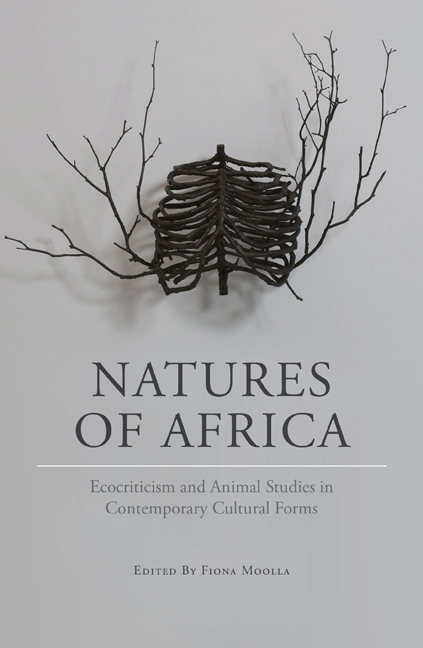Book contents
- Frontmatter
- Table of Contents
- Foreword
- Introduction
- 1 ‘Here is Some Baobab Leaf!’: Sunjata, Foodways and Biopiracy
- 2 Shona as a Land-Based Nature-Culture: A Study of the (Re)Construction of Shona Land Mythology in Popular Songs
- 3 The Environment as Significant Other: The Green Nature of Shona Indigenous Religion
- 4 Animal Oral Praise Poetry and the Samburu Desire to Survive
- 5 The Paradoxes of Voluntourism: Strategic Visual Tropes of the Natural on South African Voluntourism Websites
- 6 Towards an Ecocriticism in Africa: Literary Aesthetics in African Environmental Literature
- 7 Critical Intersections: Ecocriticism, Globalised Cities and African Narrative, with a Focus on K. Sello Duiker's Thirteen Cents
- 8 Navigating Gariep Country: Writing Nature-Culture in Borderline by William Dicey
- 9 Negotiating Identity in a Vanishing Geography: Home, Environment and Displacement in Helon Habila's Oil on Water
- 10 Human Masks? Animal Narrators in Patrice Nganang's Dog Days: An Animal Chronicle and Alain Mabanckou's Memoirs of a Porcupine
- 11 Nature, Animism and Humanity in Anglophone Nigerian Poetry
- 12 Animals, Nostalgia and Zimbabwe's Rural Landscape in the Poetry of Chenjerai Hove and Musaemura Zimunya
- About the authors
- Acknowledgements
- Notes
- Index
Introduction
Published online by Cambridge University Press: 10 May 2018
- Frontmatter
- Table of Contents
- Foreword
- Introduction
- 1 ‘Here is Some Baobab Leaf!’: Sunjata, Foodways and Biopiracy
- 2 Shona as a Land-Based Nature-Culture: A Study of the (Re)Construction of Shona Land Mythology in Popular Songs
- 3 The Environment as Significant Other: The Green Nature of Shona Indigenous Religion
- 4 Animal Oral Praise Poetry and the Samburu Desire to Survive
- 5 The Paradoxes of Voluntourism: Strategic Visual Tropes of the Natural on South African Voluntourism Websites
- 6 Towards an Ecocriticism in Africa: Literary Aesthetics in African Environmental Literature
- 7 Critical Intersections: Ecocriticism, Globalised Cities and African Narrative, with a Focus on K. Sello Duiker's Thirteen Cents
- 8 Navigating Gariep Country: Writing Nature-Culture in Borderline by William Dicey
- 9 Negotiating Identity in a Vanishing Geography: Home, Environment and Displacement in Helon Habila's Oil on Water
- 10 Human Masks? Animal Narrators in Patrice Nganang's Dog Days: An Animal Chronicle and Alain Mabanckou's Memoirs of a Porcupine
- 11 Nature, Animism and Humanity in Anglophone Nigerian Poetry
- 12 Animals, Nostalgia and Zimbabwe's Rural Landscape in the Poetry of Chenjerai Hove and Musaemura Zimunya
- About the authors
- Acknowledgements
- Notes
- Index
Summary
This book emerged out of a conviction that environment and animals are vital to an all-encompassing flourishing – where the word ‘vital’ suggests more than just ‘important’ but, retrieving its deeper etymological root, where environment and animals are ‘vita’– they are life itself. This book emerged out of a conviction, and not much else: there has been no funding or major conferences behind it. These facts about the coming into existence of the volume have had paradoxical consequences. On the one hand, the individual members of the community that has been established through the volume, for the most part, have never physically met except through the conversations conducted in cyberspace beneath the tree of knowledge of our project site. The conviction that has inspired the volume has therefore not imposed a massive carbon cost on the environment it is moved to respect but, instead, has relied on ‘clean’ technologies. One might say that it has translated theory into praxis. However, the ‘clean’ technology that has allowed the digital cultural communion of the contributors could not have emerged without just over three centuries of dirty industrialisation, and its concomitant global social, cultural and economic cost to people, animals and environment.
This book has been motivated by the instinct that recognition of the life of animals and the significance of the natural world are not foreign to continental Africa, but are deeply constitutive of the cultures that together create a strategically essentialised Africa in the postcolonial period. This intuition could not be verified because the scholarship, with the regional exception of South Africa and its strong focus on literary culture, for the most part does not exist. Mention must be made here, however, of the publication of the papers presented at a conference titled ‘Literature, Nature and the Land: Ethics and Aesthetics of the Environment’, which was convened at the University of Zululand, South Africa, in 1992. The conference proceedings include papers on several African writers, including Ayi Kwei Armah, Kofi Awoonor, Wole Soyinka, Es'kia Mphahlele and Mazisi Kunene, among others.
Cheryll Glotfelty, in the introduction to The Ecocriticism Reader (Glotfelty and Fromm 1996), identifies 1993 as the year in which ecocriticism emerged as a clearly defined critical school in the Anglo- American academy.
- Type
- Chapter
- Information
- Natures of AfricaEcocriticism and Animal Studies in Contemporary Cultural Forms, pp. 1 - 26Publisher: Wits University PressPrint publication year: 2016



